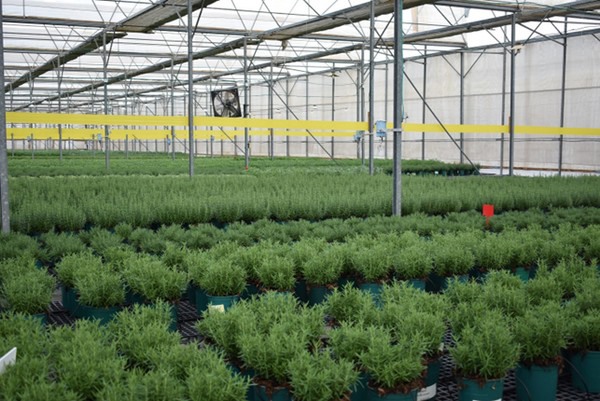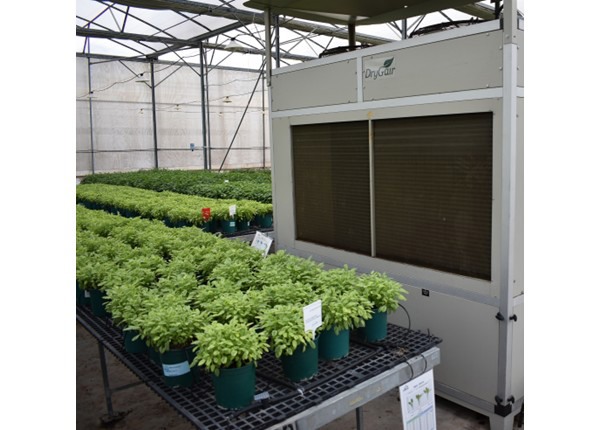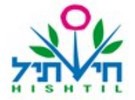Hishtil is a specialist propagator of herbs, vegetables, and ornamental young plants and supplies unrooted and rooted cuttings and grafted plants to the professional and hobby markets worldwide. Annually, it produces more than one billion conventional and organic plants, of which approximately 120 million are grafted vegetables. Production takes place on 30ha in Israel, spread over five nurseries, and on a further 32ha of production facilities overseas. Last month, FloralDaily visited their new mother stock facility in Gderot, where we spoke with Haim Rosenblum, Hishtil'si Sales and Marketing Director.

Haim Rosenblum in their new mother stock location in Gderot.
Growth via joint ventures
Over the years, Hishtil has grown internationally by entering into several joint ventures. For instance, in Spain, Hishtil-Gelpi began as a joint venture between Hishtil and GelboPlant in 2013. It is also involved in joint ventures in Italy, the U.S.A, Mexico, and South Africa. The two sites in Türkiye that started as joint ventures became 100% owned by Hishtil in March 2022. Explained Rosenblum, "Those are all areas with warm climates; that's where our expertise lies. We prefer to partner with companies that are large and strong enough to manage our product marketing and sales locally. We then provide the cultivation expertise. As we don't want to compete with our joint ventures, we do not offer B2B exports for the professional market from Israel to these countries".

Towards 100% organic
Hishtil's flagship export products are, without a doubt, their herbs and grafted vegetable plants. As Rosenblum expounded, "Our current sales ratio is 50% organic and 50% conventional - we want to go entirely organic, though that may take a while because finding the correct protocol for each crop takes time. This focus on organic is one of our core strengths. Several companies have tried and failed to establish organic propagation operations. Companies cultivating in Africa include some suppliers of such products, but their way of working and their product quality usually cannot match ours. That could be because of several factors like water quality or plant protection protocols. It's a very challenging segment. Our cultivation technicians are therefore always ready to assist and advise customers if needed".
"Hishtil is well advanced in the vegetative production of herbs – which due to excellent weather, long experience, cutting-edge technology, and the widest assortment, makes us a global leader."
High levels of customer service are essential
According to Rosenblum, besides product quality and the focus on organic cultivation, the company is very strong in a third area, customer service. "We have a very extensive network of suppliers, partners, and clients. For instance, if a customer requires a technical solution to a growing problem, our staff can often refer them to the relevant experts, not only in Israel but also in those countries where we have joint ventures".

A drying system reduces the need for crop protectants
In line with their focus on organic production, Hishtil also pays great attention to sustainability. As Rosenblum outlined, "In our Gderot facility, we collect rainwater which we treat and use for irrigation. The propagation focus is on Integrated Crop Production (I.C.P.). Dryers are used in greenhouses because free water on plant foliage and stems creates a micro-environment in which diseases can thrive. Due to this drying system, we not only need fewer crop protection products, but we also save energy. Also, in the local market, we collect, clean, and reuse all the plant trays which we deliver - these and our pots are all made from recycled materials. Any broken ones are sent for recycling."
Hishtil is not a plant breeder itself but has extensive and strategic partnerships with leading breeders and research institutes around the world. This collaboration allows Hishtil to constantly introduce new varieties, often as exclusives, to the benefit of its customers – including cultivars resistant to disease and tolerant of environmental extremes.
Introducing automation and robotic devices
Difficulties recruiting sufficient workers in recent years, and increasing costs of the available labor, have led Hishtil to look at opportunities for the utilization of automation and robotics. Historically, the working stations for activities such as grafting, picking and sticking of un-rooted cuttings, and transplanting, were based on manual working and required dozens of workers.
"In some cases, Hishtil has been able to utilize 'off-the-shelf' equipment, but in other cases, we have needed to work with suppliers in order to develop unique solutions for our needs. In addition, our in-house R&D team is closely involved in assessing innovations as they come to market," remarked Rosenblum.
Company movie.
Grafted Vine plants for the Israeli market and sweet potatoes for export
In recent years, Hishtil has not only led in herb and vegetable innovation but has seen opportunities for product diversification too. "Our grafted grapevines are solving a problem in Israel because, for many years, virus-carrying plants were brought in from overseas. We are keeping virus-free mother plants of scion and rootstock cultivars under protection," Rosenblum said.
"Of course, once they are planted out in the field by customers, viruses and diseases in the soil or environment can still attack them, but critically the starting material is 100% clean and robust. We aim to use that same protocol for grape varieties from private companies on an exclusive base. In addition to which, we are using the same techniques to graft apples for the largest Israeli apple grower. Developments with other fruit trees are underway."
In recent years, the company also began propagating and supplying sweet potatoes (Ipomoea batatas). These vegetatively-raised young plants are being exported in volume to European growers in cold areas where cuttings/slips don't develop and yield so well.
"Hishtil's overarching strategy is to give our customers the 'tools' they need to increase yield and to improve product quality. We do it with the help of our in-house R&D Department, which collaborates with academic research institutes here in Israel and overseas. Because of our aim to reduce the impact on the environment, we are looking for non-chemical solutions wherever possible," Rosenblum concludes.
For more information:
Hishtil Ltd.
Email: info@hishtil.com
www.hishtil.com
